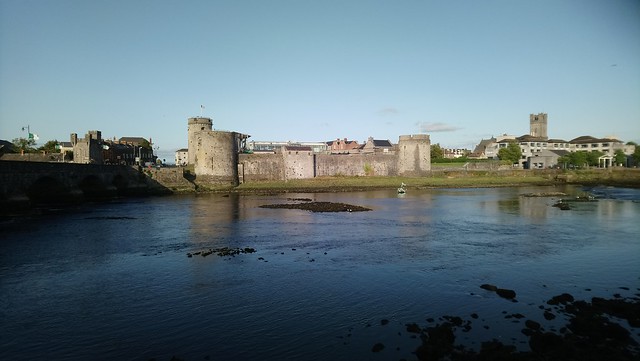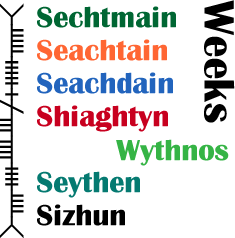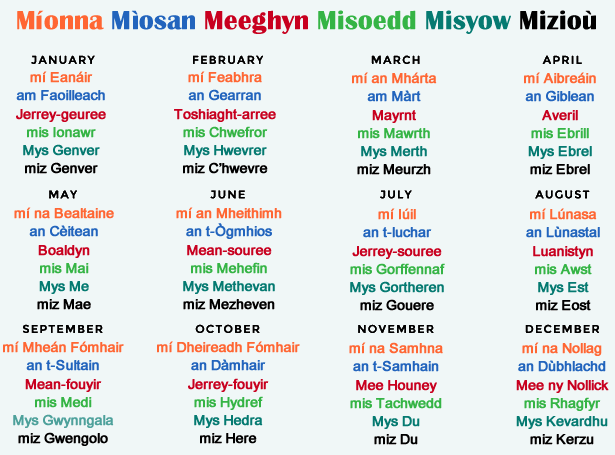Words for seasons in Celtic languages.
Spring
| Proto-Celtic | *wesrakos / *wesantos = spring |
|---|---|
| Old Irish (Goídelc) | errach [ˈer͈ax] = spring |
| Irish (Gaeilge) | earrach [əˈɾˠax / ˈaɾˠəx / ˈaɾˠa(h)] = spring |
| Scottish Gaelic (Gàidhlig) | earrach [jar̪ˠəx] = spring |
| Manx (Gaelg) | arragh [ˈarax] = spring |
| Proto-Brythonic | *wesantēnos = spring |
| Old Welsh | guiannuin = spring |
| Middle Welsh (Kymraec) | gwaeanhwyn / gwaeannwyn / gwannwyn = spring |
| Welsh (Cymraeg) | gwanwyn [ˈɡwanwɨ̞n / ˈɡwanwɪn] = spring, springtime |
| Old Cornish | guaintoin = spring |
| Cornish (Kernewek) | gwaynten = spring |
| Breton (Brezhoneg) | nevez-amzer = spring |
Etymology, from the Proto-Indo-European *wósr̥ (spring) [source].
Summer
| Proto-Celtic | *samos = summer |
|---|---|
| Gaulish | samo- = summer |
| Old Irish (Goídelc) | sam [saṽ] / samrad [ˈsaṽrað] = summer |
| Irish (Gaeilge) | samhradh [ˈsˠəuɾˠə / ˈsˠəuɾˠuː / ˈsˠəuɾˠu] = summer, summer garland |
| Scottish Gaelic (Gàidhlig) | samhradh [sãũrəɣ] = summer |
| Manx (Gaelg) | sourey [ˈsaurə] = summer |
| Proto-Brythonic | *haβ̃ = summer |
| Old Welsh | ham = summer |
| Middle Welsh (Kymraec) | haf = summer |
| Welsh (Cymraeg) | haf [haːv / haː] = summer |
| Old Cornish | haf = summer |
| Cornish (Kernewek) | hav = summer |
| Old Breton | ham = summer |
| Middle Breton | haff = summer |
| Breton (Brezhoneg) | hañv = summer |
Etymology, from the Proto-Indo-European *sm̥-h₂-ó- (summer) [source].
Autumn
| Old Irish (Goídelc) | fogamar / fogomur [ˈɡʲaṽʲrʲəð] = autumn |
|---|---|
| Middle Irish (Gaoidhealg) | fogamur = harvest |
| Irish (Gaeilge) | fómhar [ˈfˠoːɾˠ / ˈfˠoːvˠəɾˠ / ˈfˠɔːwəɾˠ] = autumn, harvest season, harvest |
| Scottish Gaelic (Gàidhlig) | foghar [fo.ər] = autumn, harvest, (act of) harvesting |
| Manx (Gaelg) | fouyr = harvets, autumn |
| Middle Welsh (Kymraec) | heduref / heduueref = autumn possibly from hydd (stag) & bref (bellow) |
| Welsh (Cymraeg) | hydref [ˈhədrɛ(v) / ˈhədra] = autumn, period of full maturity, rutting season, mating time |
| Cornish (Kernewek) | hedra / kynnyay / kydnyadh = autumn |
| Breton (Brezhoneg) | here / kozhamzer / diskar-amzer = autumn |
Etymology (Goidelic languages), from the Proto-Celtic *wo-gamur (under winter) from *gamur (winter) [source].
Winter
| Proto-Celtic | *gyemos / *gamur = winter |
|---|---|
| Gaulish | giamos = winter (personal name) |
| Primitive Irish | ᚌᚐᚋᚔ- (gami/gen) = winter |
| Old Irish (Goídelc) | gam / gaim = winter, winter storm gaimred [ˈɡʲaṽʲrʲəð] = winter |
| Irish (Gaeilge) | geimhreadh [ˈɟiːɾʲə / ˈɟiːvʲɾʲə / ˈɟɛvʲɾʲu] = winter |
| Scottish Gaelic (Gàidhlig) | geamhradh [gʲãũrəɣ] = winter |
| Manx (Gaelg) | geurey [ˈɡʲeurə / ˈɡʲuːrə] = winter |
| Old Welsh | gaem = winter |
| Middle Welsh (Kymraec) | gayaf = winter |
| Welsh (Cymraeg) | gaeaf [ˈɡeɨ̯av / ˈɡei̯av] = winter |
| Old Cornish | goyf = winter |
| Cornish (Kernewek) | gwav / gwâv = winter |
| Old Breton | guoiam = winter |
| Middle Breton | gouaff = winter |
| Breton (Brezhoneg) | goañv [ˈɡwãw / ˈɡwã] = winter |
Etymology, from the Proto-Indo-European *ǵʰyem- (winter, year, frost, snow) [source].
Words marked with a * are reconstructions.
The names of the seasons, days and seasons in Celtic languages
Sources: Wiktionary, Am Faclair Beag, Online Manx Dictionary, Teanglann.ie, Geiriadur Prifysgol Cymru, Gerlyver Kernewek







